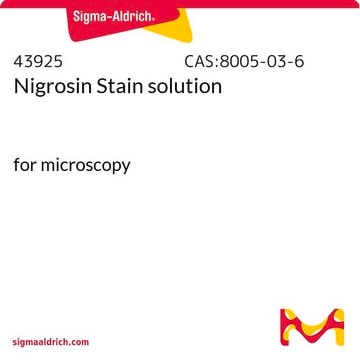Recommended Products
form
solution
Quality Level
shelf life
Expiry date on the label.
IVD
for in vitro diagnostic use
concentration
0.5 % (w/v) in water
application(s)
hematology
histology
storage temp.
room temp
Looking for similar products? Visit Product Comparison Guide
Application
General purpose cytoplasmic counterstain. Used with hematoxylin and eosin staining.
Other Notes
Certified Eosin Y, 0.5% (w/v) in water. Not acidified.
Storage Class Code
10 - Combustible liquids
WGK
WGK 2
Flash Point(F)
Not applicable
Flash Point(C)
Not applicable
Personal Protective Equipment
dust mask type N95 (US), Eyeshields, Gloves
Certificates of Analysis (COA)
Search for Certificates of Analysis (COA) by entering the products Lot/Batch Number. Lot and Batch Numbers can be found on a product’s label following the words ‘Lot’ or ‘Batch’.
Already Own This Product?
Find documentation for the products that you have recently purchased in the Document Library.
Customers Also Viewed
Frederik Denorme et al.
Blood, 127(19), 2337-2345 (2016-03-02)
Rapid vascular recanalization forms the basis for successful treatment of cerebral ischemia. Currently, tissue plasminogen activator (t-PA) is the only approved thrombolytic drug for ischemic stroke. However, t-PA does not always result in efficient thrombus dissolution and subsequent blood vessel
Kenneth C Valkenburg et al.
Oncotarget, 8(46), 80265-80277 (2017-11-09)
Prostate cancer is the most diagnosed non-skin cancer in the US and kills approximately 27,000 men per year in the US. Additional genetic mouse models are needed that recapitulate the heterogeneous nature of human prostate cancer. The Wnt/beta-catenin signaling pathway
Senna Staessens et al.
Haematologica, 105(2), 498-507 (2019-05-03)
Ischemic stroke is caused by a thromboembolic occlusion of cerebral arteries. Treatment is focused on fast and efficient removal of the occluding thrombus, either via intravenous thrombolysis or via endovascular thrombectomy. Recanalization, however, is not always successful and factors contributing
Vincent W Yang et al.
Molecular cancer research : MCR, 17(1), 165-176 (2018-08-16)
Krüppel-like factor 4 (KLF4), a zinc finger transcription factor, regulates homeostasis of the intestinal epithelium. Previously, it was reported that KLF4 functions as a tumor suppressor in colorectal cancer. Here, evidence demonstrates that KLF4 mitigates the development and progression of
Majken Siersbæk et al.
Scientific reports, 7, 40220-40220 (2017-01-11)
Epigenetic factors have been suggested to play an important role in metabolic memory by trapping and maintaining initial metabolic changes within the transcriptional regulatory machinery. In this study we fed mice a high fat diet (HFD) for seven weeks followed
Our team of scientists has experience in all areas of research including Life Science, Material Science, Chemical Synthesis, Chromatography, Analytical and many others.
Contact Technical Service








